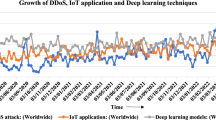Abstract
In the context of the Internet of Things (IoT), safeguarding against Distributed Denial of Service (DDoS) attacks is critical. This paper introduces an Optimized Edge-cCNN (Convolutional Neural Network) Model designed for robust DDoS detection in IoT environments. The model employs two specialized CNN layers to identify distinct DDoS attack types. To enhance its performance, we utilize the Cuckoo Search algorithm to fine-tune hyperparameters effectively. Our approach demonstrates superior accuracy compared to existing methods while remaining lightweight, making it suitable for resource-constrained edge devices. Through rigorous evaluation, our model exhibits its effectiveness in real-time DDoS threat mitigation. The Optimized Edge-cCNN Model presents an innovative solution for enhancing IoT security, combining deep learning and optimization techniques to combat evolving DDoS attacks effectively.
Access this chapter
Tax calculation will be finalised at checkout
Purchases are for personal use only
Similar content being viewed by others
References
Internet of things and wireless sensor network for smart cities. Int. J. Comput. Sci. 14, 50–55 (2017). https://doi.org/10.20943/01201705.5055
Wireless connected smart microsystems. Sens. Mater. 447 (2018). https://doi.org/10.18494/sam.2018.1765
Detection and prevention algorithm of DDoS attack over the IoT networks. Tem J. 899–906 (2020). https://doi.org/10.18421/tem93-09
Abbas, N., Nasser, Y., Shehab, M., Sharafeddine, S.: Attack-specific feature selection for anomaly detection in software-defined networks. In: 2021 3rd IEEE Middle East and North Africa Communications Conference (MENACOMM), pp. 142–146. IEEE (2021)
Bak, N., Chang, B., Choi, K.: SmartVisual: a visualisation tool for SmartThings IoT apps using static analysis. IET Softw. 14, 411–422 (2020). https://doi.org/10.1049/iet-sen.2019.0344
Chen, F., Luo, D., Xiang, T., Truong, H.: IoT cloud security review. ACM Comput. Surv. 54, 1–36 (2021). https://doi.org/10.1145/3447625
Chen, F., Xiao, Z., Xiang, T., Truong, H.: A full lifecycle authentication scheme for large-scale smart IoT applications. IEEE Trans. Depend. Sec. Comput. 1 (2022). https://doi.org/10.1109/tdsc.2022.3178115
Cvitić, I., Perakovic, D., Gupta, B.B., Choo, K.K.R.: Boosting-based DDoS detection in Internet of Things systems. IEEE Internet Things J. 9(3), 2109–2123 (2021)
Dahiya, A., Gupta, B.B.: A reputation score policy and Bayesian game theory based incentivized mechanism for DDoS attacks mitigation and cyber defense. Futur. Gener. Comput. Syst. 117, 193–204 (2021)
Doshi, R., Apthorpe, N., Feamster, N.: Machine learning DDoS detection for consumer Internet of Things devices. In: 2018 IEEE Security and Privacy Workshops (SPW) (2018). https://doi.org/10.1109/spw.2018.00013
Fayyaz, U., Shah, G.: IoT DoS and DDoS attack detection using ResNet. In: 2020 IEEE 23rd International Multitopic Conference (INMIC) (2020). https://doi.org/10.1109/inmic50486.2020.9318216
Hu, B., Gaurav, A., Choi, C., Almomani, A.: Evaluation and comparative analysis of semantic web-based strategies for enhancing educational system development. Int. J. Semant. Web Inform. Syst. (IJSWIS) 18(1), 1–14 (2022)
Khader, R., Eleyan, D.: Survey of DoS/DDoS attacks in IoT. Sustain. Eng. Innov. ISSN 2712–0562 3, 23–28 (2021). https://doi.org/10.37868/sei.v3i1.124
Khanam, S., Tanweer, S., Khalid, S.S.: Future of internet of things: enhancing cloud-based IoT using artificial intelligence. Int. J. Cloud Appl. Comput. (IJCAC) 12(1), 1–23 (2022)
Kiran, M.A., Pasupuleti, S.K., Eswari, R.: Efficient pairing-free identity-based Signcryption scheme for cloud-assisted IoT. Int. J. Cloud Appl. Comput. (IJCAC) 12(1), 1–15 (2022)
Kumar, R., Singh, S.K., Lobiyal, D., Chui, K.T., Santaniello, D., Rafsanjani, M.K.: A novel decentralized group key management scheme for cloud-based vehicular IoT networks. Int. J. Cloud Appl. Comput. (IJCAC) 12(1), 1–34 (2022)
Mishra, A., Gupta, N., Gupta, B.: Defense mechanisms against DDoS attack based on entropy in SDN-cloud using pox controller. Telecommun. Syst. 77, 47–62 (2021)
Nagpal, N.: Analyzing role of big data and IoT in smart cities. Int. J. Adv. Eng. Manage. Sci. 3, 584–586 (2017). https://doi.org/10.24001/ijaems.3.5.29
Quist, A.: Digital forensic challenges in internet of things (IoT). Adv. Multidiscip. Sci. Res. J. Publ. 1, 119–124 (2022). https://doi.org/10.22624/aims/crp-bk3-p20
Raj, M.G., Pani, S.K.: Chaotic whale crow optimization algorithm for secure routing in the IoT environment. Int. J. Seman. Web Inform. Syst. (IJSWIS) 18(1), 1–25 (2022)
Sadatacharapandi, T.P., Padmavathi, S.: Survey on service placement, provisioning, and composition for fog-based IoT systems. Int. J. Cloud Appl. Comput. (IJCAC) 12(1), 1–14 (2022)
Sarrab, M., Alshohoumi, F.: Assisted-fog-based framework for IoT-based healthcare data preservation. Int. J. Cloud Appl. Comput. (IJCAC) 11(2), 1–16 (2021)
Shah, Z., Ullah, I., Li, H., Levula, A., Khurshid, K.: Blockchain based solutions to mitigate distributed denial of service (DDoS) attacks in the Internet of Things (IoT): a survey. Sensors 22, 1094 (2022). https://doi.org/10.3390/s22031094
Silva, F., Silva, E., Neto, E., Lemos, M., Neto, A., Esposito, F.: A taxonomy of DDoS attack mitigation approaches featured by SDN technologies in IoT scenarios. Sensors 20, 3078 (2020). https://doi.org/10.3390/s20113078
Singh, A., Gupta, B.B.: Distributed denial-of-service (DDoS) attacks and defense mechanisms in various web-enabled computing platforms: issues, challenges, and future research directions. Int. J. Semant. Web Inform. Syst. (IJSWIS) 18(1), 1–43 (2022)
Tiwari, A., Garg, R.: Adaptive ontology-based IoT resource provisioning in computing systems. Int. J. Semant. Web Inform. Syst. (IJSWIS) 18(1), 1–18 (2022)
Ullah, I., Mahmoud, Q.: A two-level flow-based anomalous activity detection system for IoT networks. Electronics 9, 530 (2020). https://doi.org/10.3390/electronics9030530
Wahab, O.A., Bentahar, J., Otrok, H., Mourad, A.: Optimal load distribution for the detection of VM-based DDoS attacks in the cloud. IEEE Trans. Serv. Comput. 13(1), 114–129 (2017)
Wassan, S., et al.: Gradient boosting for health IoT federated learning. Sustainability 14(24), 16842 (2022)
Zhang, Q., Guo, Z., Zhu, Y., Vijayakumar, P., Castiglione, A., Gupta, B.B.: A deep learning-based fast fake news detection model for cyber-physical social services. Pattern Recogn. Lett. 168, 31–38 (2023)
Acknowledgement
This research work is supported by National Science and Technology Council (NSTC), Taiwan Grant No. NSTC112-2221-E-468-008-MY3.
Author information
Authors and Affiliations
Corresponding author
Editor information
Editors and Affiliations
Rights and permissions
Copyright information
© 2024 The Author(s), under exclusive license to Springer Nature Switzerland AG
About this paper
Cite this paper
Gupta, B.B., Gaurav, A., Chui, K.T., Arya, V. (2024). Optimized Edge-cCCN Based Model for the Detection of DDoS Attack in IoT Environment. In: Feng, J., Jiang, F., Luo, M., Zhang, LJ. (eds) Edge Computing – EDGE 2023 . EDGE 2023. Lecture Notes in Computer Science, vol 14205. Springer, Cham. https://doi.org/10.1007/978-3-031-51826-3_2
Download citation
DOI: https://doi.org/10.1007/978-3-031-51826-3_2
Published:
Publisher Name: Springer, Cham
Print ISBN: 978-3-031-51825-6
Online ISBN: 978-3-031-51826-3
eBook Packages: Computer ScienceComputer Science (R0)




